Physics with Astrophysics
Excited by discovery? Passionate about exploring the cosmos? This is the degree for you.
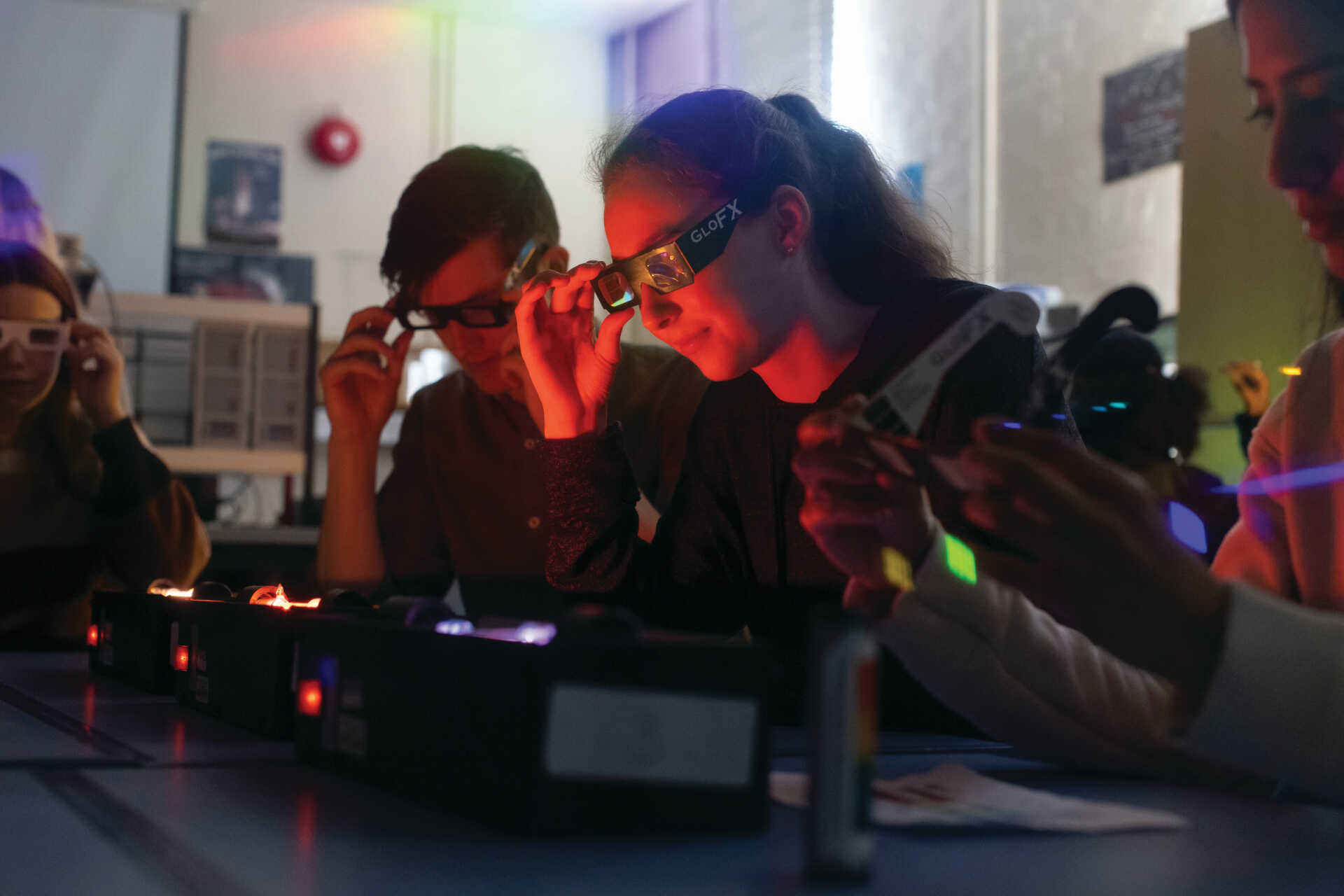
Excited by discovery? Passionate about exploring the cosmos? This is the degree for you.
Physics gives you the tools to understand our world at a fundamental level, from the smallest sub-atomic particles to the large-scale structure of the universe. By combining your study with astrophysics, you’ll use the principles of physics, our dedicated astrophysics lab module and fantastic facilities such as the Beacon Observatory, to explore the cosmos – from our own solar system to galaxies and cosmology.
You'll also develop transferable skills to open up a world of job opportunities, leading to careers in the growing space industry, finance, manufacturing and technology.
If you don’t have a science background or don’t meet our entry requirements, you can take our foundation year.
You might also be interested in our Physics or Astronomy, Space Science and Astrophysics degrees. We also offer a four-year Integrated Master's (MPhys).
This course is fully accredited by the Institute of Physics.
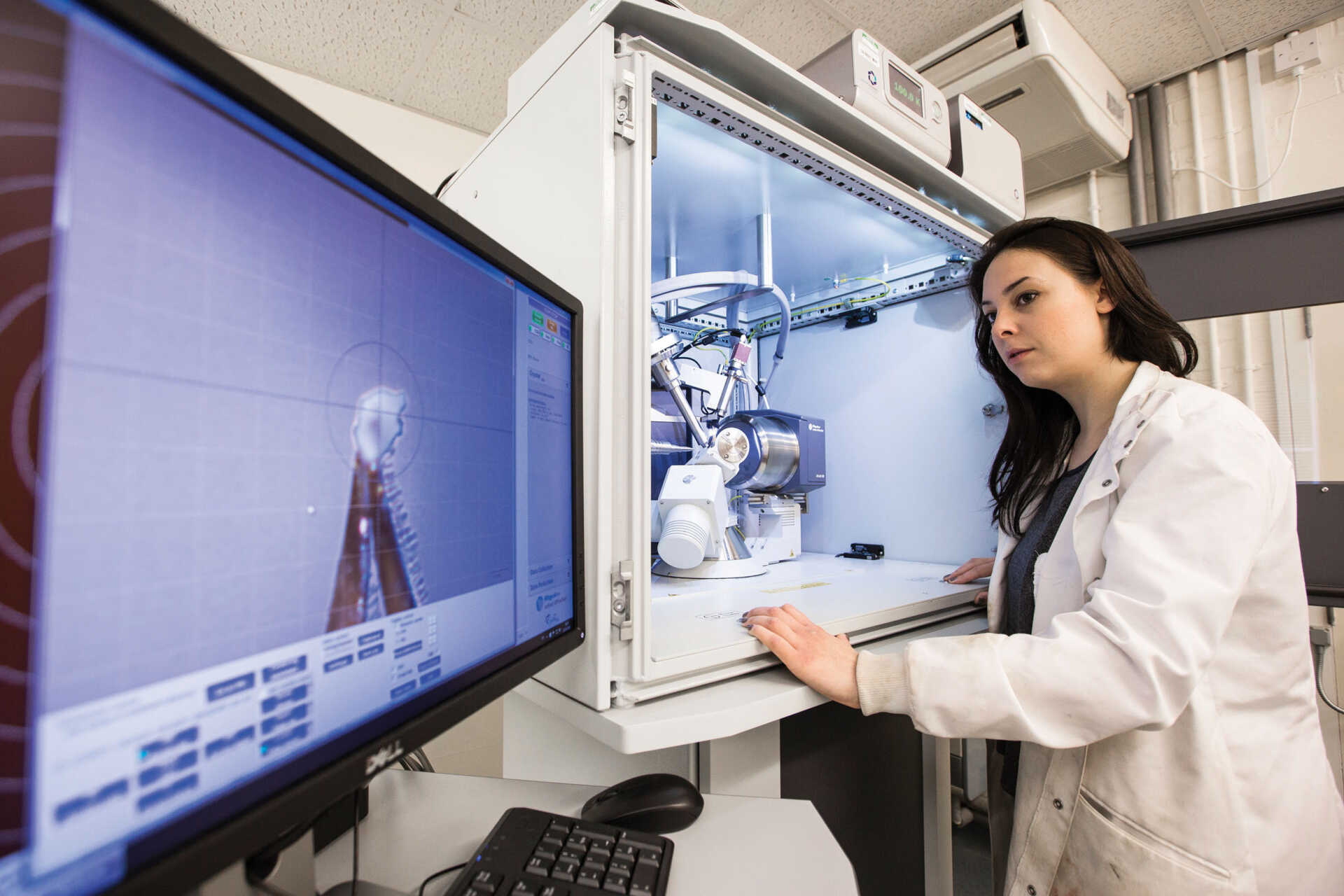
Your degree opens the door to lots of exciting careers; a professional placement year can help you discover which option is right for you.
You'll be able to move between our courses in the earlier years, ensuring you are studying the best course for you.
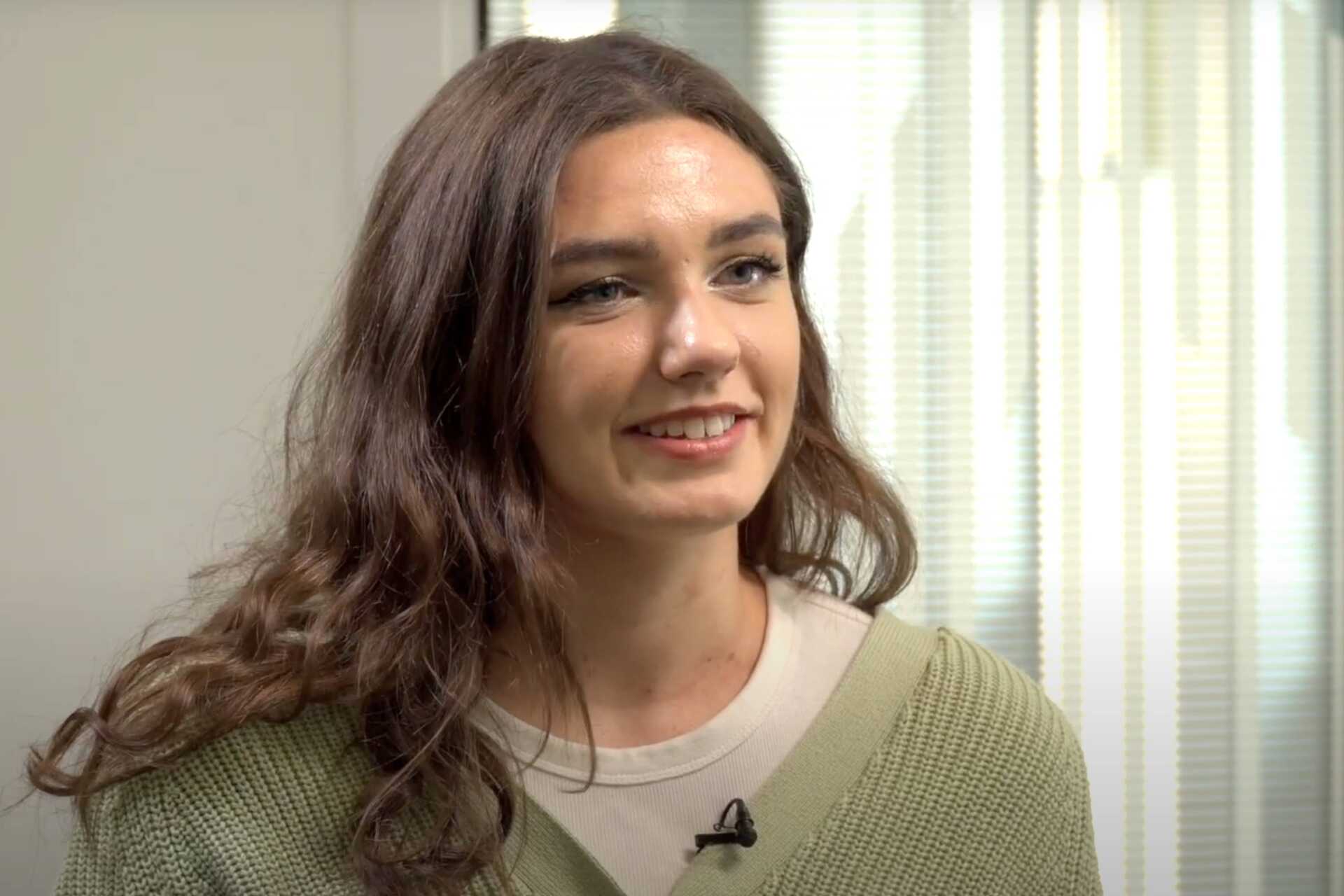
Exploring all areas of physics was important to Lucy Abbott, which is why she chose to study at Kent – that and Kent's friendly atmosphere.
You'll discover the latest developments in areas such as quantum materials and medical imaging from innovative teachers who are also active researchers.
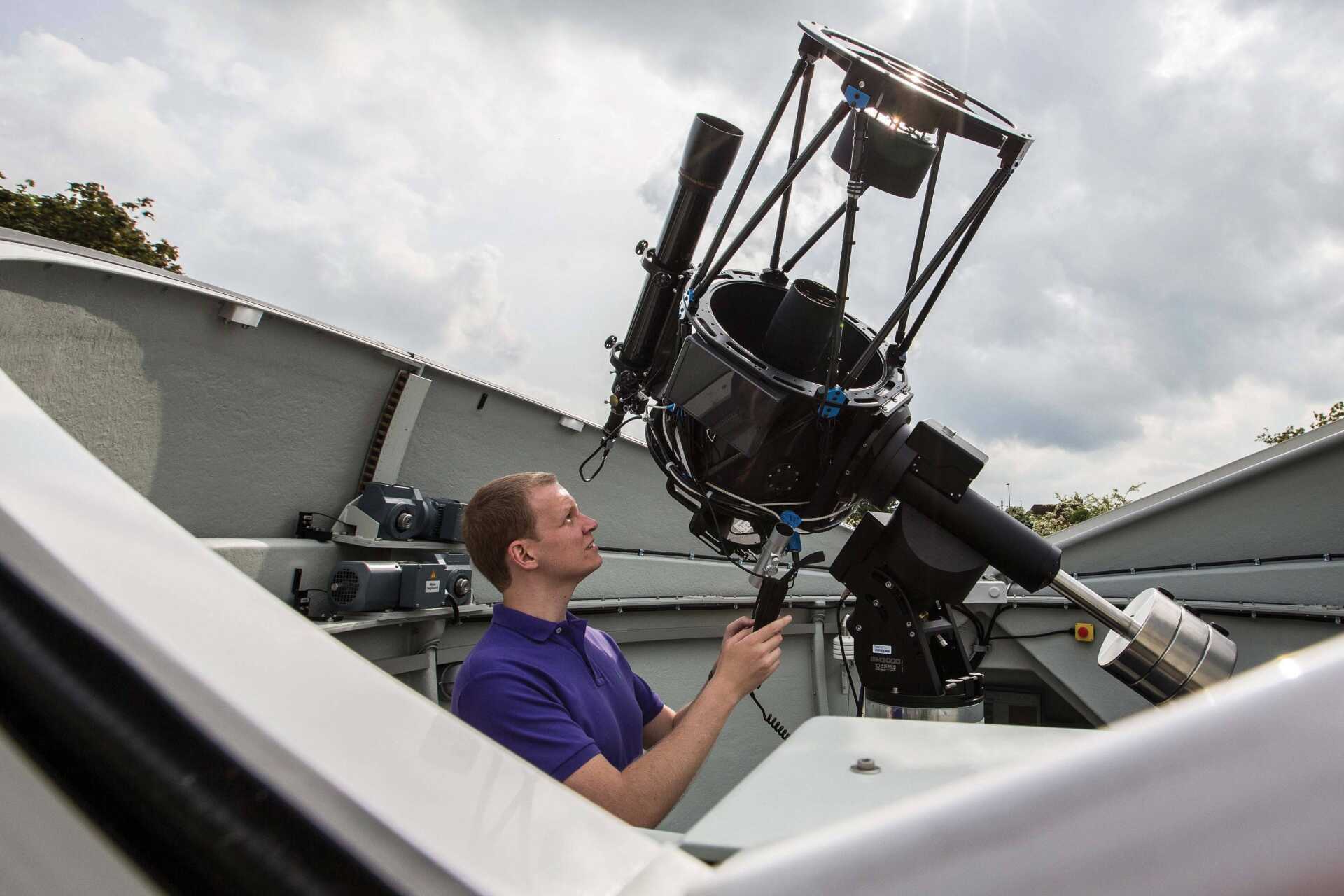
You'll use newly-refurbished physics and astronomy labs, a photonics centre and the Beacon Observatory with optical telescope.
Our typical offer levels are listed below and include indicative contextual offers. If you hold alternative qualifications just get in touch and we'll be glad to discuss these with you.
ABB, including A level Mathematics at B (not Use of Mathematics)
The University will consider applicants holding/studying BTEC Extended National Diploma Qualifications (QCF; NQF;OCR) in Engineering. A typical offer would be to achieve Distinction, Distinction, Merit.
128 tariff points - typically H5, H6, H6 at HL including HL Maths/Maths Method or HL Mathematics: Analysis and Approaches at 5 or SL Maths/Maths Methods at 6 (not Maths Studies/SL Maths: Applications & Interpretations).
N/A
The University will consider applicants holding T level qualifications in subjects closely aligned to the course.
The University welcomes applications from Access to Higher Education Diploma candidates for consideration. A typical offer would be to obtain Access to HE Diploma with 45 Credits at level 3 with 30 credits at Distinction and 15 credits at Merit. A Science Access programme including Maths and Physics credits at Level 3 would be required.
We consider all applications on an individual basis during Clearing and you're encouraged to get in touch to discuss your grades. You're most likely to be offered a place in Clearing for this course if you hold the following subjects:
The following modules are offered to our current students. This listing is based on the current curriculum and may change year to year in response to new curriculum developments and innovation:
You’ll get to grips with the broad knowledge base on which physics is built and develop your, experimental, computational, statistical and analytical skills.
This module provides an introduction to astronomy, beginning with our own solar system and extending to objects at the limits of the universe. Straightforward mathematics is used to develop a geometrical optics model for imaging with lenses and mirrors, and this is then used to explore the principles of astronomical telescopes.
This module builds on prior knowledge of arithmetic, algebra, and trigonometry. It will cover key areas of mathematics which are widely used throughout undergraduate university physics. In the first part it will look at functions, series, derivatives and integrals. In the second part it will look at vectors, matrices and complex numbers.
This module builds on the Mathematics I module to develop key mathematical techniques involving multiple independent variables. These include the topics of differential equations, multivariate calculus, non-Cartesian coordinates, and vector calculus that are needed for Physics modules in Stages 2 and 3.
In this module the mathematics of vectors and calculus are used to describe motion, the effects of forces in accordance with Newton's laws, and the relation to momentum and energy. This description is extended to rotational motion, and the force of gravity. In addition, the modern topic of special relativity is introduced.
This module examines key physical phenomena of waves and fields which extend over time and space. The first part presents a mathematical description of oscillations and develops this to a description of wave phenomena. The second part is an introduction to electromagnetism which includes electric and magnetic fields before providing an introduction to the topic of electrical circuits.
This module develops the principles of mechanics to describe mechanical properties of liquids and solids. It also introduces the principles of thermodynamics and uses them to describe properties of gases. The module also introduces the modern description of atoms and molecules based on quantum mechanics.
This module guides students through a series of experiments giving them experience in using laboratory apparatus and equipment. Students will also learn how to accurately record and analyse data in laboratory notebooks and write scientific laboratory reports. The experiments cover subjects found in the Physics degree program and are run parallel with Computing Skills workshops in which students are introduced to the concept of using programming/scripting languages to analyse and report data from their experiments.
One-on-one meetings and small group tutorials focused on academic progression and the development of key skills to support the core curriculum and future study or employment. Students meet with their Academic Advisor individually or in small groups at intervals during the academic year. Individual meetings review academic progress, support career planning etc. Themed tutorials develop transferable skills; indicative topics are essay and report writing, presentation skills, sourcing information, critical analysis etc. The tutorials are informal involving student activity and discussion. Year group events deliver general information e.g. on University resources, 4-year programmes, module selection etc.
You’ll deepen your understanding of physics and astrophysics, carry out in-depth laboratory experiments and work on group projects.
Mathematical techniques are essential for solving problems in physics and related fields. You will gain comprehensive grounding in the mathematical methods necessary for solving differential equations, understanding special functions, and conducting harmonic analysis. You’ll also get a grounding in numerical methods and asymptotic analysis, preparing students for the analytical challenges they will encounter in their studies and professional lives.
Building on a strong mathematical foundation for further study and research, the skills you develop will not only benefit you academically but also enhance your employability, preparing you for technical roles in research, engineering, data analysis, and beyond, where rigorous mathematical reasoning and problem-solving abilities are highly valued by employers.
Modern science is a collaborative effort, requiring physicists to work in teams of varying sizes, and to communicate their results to a wide range of audiences. We ensure you will develop your ability to conduct complex investigations as a team, and to disseminate your outcomes.
You’ll do this through producing more comprehensive written reports and using computational scripts to analyse and visualise data. A key focus is on analysis of experimental uncertainties and comparison with underlying physical theories. Your team-working skills will be developed through a group project focused on a real, open-ended research topic, with problems chosen from a list drawn from the research interests of academics, problems set by industry, and areas such as physics education and outreach.
The skills developed in this module will help prepare you for more in-depth investigations later in your degree and for collaborative working in your future career.
Dive into the fascinating world of quantum mechanics, where you will develop a comprehensive understanding of wave functions, the Schrödinger equation, and quantum numbers, essential for describing the properties of key physical systems.
This module introduces you to critical terminology and mathematical concepts fundamental to quantum mechanics, such as eigenstates, eigenvalues, and expectation values. You will explore the Schrödinger equation through various important systems, including two-state systems, particles in simple potentials, and the simple harmonic oscillator. You will also learn how to use the Schrödinger equation in different coordinate systems to understand the concept of angular momentum in quantum mechanics.
In the realm of atomic physics, you will investigate solutions for atoms, with a particular focus on the hydrogen atom, and study their interactions with electromagnetic radiation. These methods extend to the study of molecules and nuclei, providing a robust framework for understanding a wide range of physical phenomena.
This module offers a detailed and accurate portrayal of atomic structures, which are the fundamental building blocks of numerous physical processes and phenomena.
Electromagnetism and Relativity are two fundamental classical theories in Physics. You'll be introduced to a range of important laws and principles that lay the foundation for studies in these fields. You'll develop an understanding of magnetic and electric fields and how to apply Maxwell’s laws to describe all phenomena involving electromagnetic waves (from radio waves to visible light, X-rays and gamma rays).
Once the propagation of light has been discussed and understood in the context of Electromagnetism, you will study the consequences of the constant velocity of light in the context of Einstein’s theory of Special Relativity. The theory will be applied to understanding concepts such as time dilation and event horizon.
You'll acquire a deeper understanding of highly formalised theories, and how these are powerful tools to solve a diverse range of problems. You'll also develop your skills for formal reasoning and fundamental mathematical tools (vector fields in particular), applying these to solve problems in the context of the systems studied in the module and will contribute to the skills set of a physicist for your future career.
This module builds on the introduction to astronomy you will have learned in earlier stages of your degree. You'll enhance your knowledge of astrophysics through the study of the theory, formalism and fundamental principles, developing a rigorous grounding in observational, computational and theoretical aspects of astrophysics.
In particular, you'll study topics such as properties of galaxies and stars, the detection of planets outside the solar system, and CCD cameras. You will also have the opportunity to take part in observations with the Beacon Observatory, getting hands on in exploring the universe.
Machine learning expertise is a critical need in fields ranging from medicine and biology to chemistry and physics. You'll benefit from hands-on learning to meet the demands of industries that increasingly rely on machine learning for data analysis, forecasting and classification tasks.
Building on key Python programming skills, you'll manipulate authentic datasets, preprocess data for analysis, select suitable algorithms, and interpret outcomes. This involves formulating hypotheses, devising experimental setups to validate hypotheses, and employing statistical and machine learning techniques to analyse results.
You'll be introduced to essential concepts including model training/validation/testing, underfitting and overfitting. Upon completion of the module, you'll have the practical skills necessary to apply modern machine learning techniques across various natural science disciplines.
You’ll take more advanced and specialised modules and conduct open-ended laboratory investigations.
All modern technologies rely on the use of light in some way or another, which makes understanding light absolutely essential. This module provides you with an immersive experience, allowing you to discover fundamental and contemporary concepts that shape our understanding of how light interacts with matter. You'll explore the practical applications of optics and photonics in various fields, such as telecommunications, medicine, manufacturing, and computing, giving you experience aligned with a range of potential careers.
Throughout the module, you'll acquire knowledge and skills in designing and analysing optical systems, becoming proficient in using tools such as lasers and fibre optics and enhancing your problem-solving skills. In doing so, you'll understand how your developing expertise can be applied in practice, including in multi-disciplinary or multi-professional contexts, to make a positive difference to the world around you.
Explore the classic theory of thermodynamics and how the thermal properties of physical objects can be described in terms of their microscopic properties through the application of statistical mechanics. You'll learn the three laws of thermodynamics and how to use them to understand physical phenomena, such as the conversion of heat into work in an engine or the cooling cycle in a refrigerator.
You'll learn how to derive measurable, bulk properties such as temperature, heat capacity, entropy or magnetisation from the behaviour of the microscopic components in a gas or a paramagnet. Statistical mechanics bridges the gap between the microscopic and macroscopic description of the physical world; you'll apply theoretical principles, alongside a range of mathematical skills, to contemporary issues such as how heat pumps work, the effect of temperature on defects in a crystalline solid, heat capacity due to electrons in a metal, to address real-world problems and potential solutions.
Building on your studies in observational astronomy, this module provides a balanced and rigorous course in astrophysics for BSc students. You'll develop and enhance your knowledge of astrophysics through the study of the theory, formalism, and fundamental principles.
You'll also delve into the equations describing the internal structure of stars, energy transport mechanisms, nuclear fusion processes, and the evolution of stars off the main sequence. The second half of the module explores topics such as high-redshift galaxies, galaxy clusters, and active galactic nuclei (AGN), general relativity, cosmological principles, the age and stages of the universe, dark matter, dark energy, and the cosmic microwave background.
You'll finish the module having embarked on a thrilling journey through the cosmos, equipped with essential skills and understanding needed for astronomy at a professional level and be on a firm footing should you wish to pursue further studies in astrophysics at MPhys level and beyond.
Explore the constituents of matter and how the structured arrangement of atoms in a solid gives rise to their properties. You'll start by looking at the structure and properties of the nucleus, as well as its stability and fission and fusion processes. You'll then study how the regular arrangement of atoms in a lattice gives rise to crystalline solids and proceed to investigate how the behaviour of electrons in crystals is responsible for many of the properties we find in the materials driving technology (such as metals, semiconductors, magnetic materials). The theoretical principles taught in the lectures, as well as a range of mathematical skills, will be applied to solving problems, including those related to electronics and optoelectronic devices.
Become more fluent and adept at solving and discussing general problems in Physics (and its related disciplines of mathematics and engineering). This includes the use of numerical approximations to solve problems, building on the programming skills already gained , complementing the analytical methods that students have been trained to use in earlier stages.
There is no formal curriculum for this course, which uses and demands only physical and mathematical concepts with which students at this level are already familiar.
Problems are presented and solutions discussed in small seminar groups, covering topics spanning several areas in the undergraduate physics curriculum (Mechanics and statics, thermodynamics, and optics, etc), as well as those involving the application of formal logic and reasoning, simple probability, statistics, estimation and linear mathematics.
This module will develop your ability to think flexibily, enhancing your readiness to find analytical or computational solutions to many professional challenges and contemporary issues.
This computational Astrophysics and Machine Learning laboratory provides an overview and practical experience in several distinct topics of astrophysics research and builds on earlier skills development in programming. The topics of experimental and project work include data reduction, virtual observatories, big data, machine learning techniques, Astrometry, Photometry and Spectroscopy. Students are expected to take part in at least two observing nights with our Beacon Observatory. This on-campus facility offers hands-on astronomical experience with a research-grade dome and telescope, enhancing the quality of your degree experience and better preparing you for a career in the space and astronomy sector.
You'll gain a practical underpinning to your theoretical astrophysics work. Working through the experiments provided, using authentic data, will leave you with a richer appreciation and understanding of the subject matter, equipping you with skills to succeed as working astronomers, which are also transferable to many other professional disciplines.
After taking the classes students should be more fluent and adept at solving and discussing general problems in Physics (and its related disciplines of mathematics and engineering).
There is no formal curriculum for this course, which uses and demands only physical and mathematical concepts with which the students at this level are already familiar.
Problems are presented and solutions discussed in topics spanning several topics in the undergraduate physics curriculum (Mechanics and statics, thermodynamics, and optics, etc).
Problems are also discussed that primarily involve the application of formal logic and reasoning, simple probability, statistics, estimation and linear mathematics.
The aim of this module is to provide a primer into this important physics specialisation. Students develop and enhance their knowledge of medical imaging and radiology through the study of the theory, formalism and fundamental principles. The range of subjects covered is intended to give a balanced introduction to Medical Physics, with emphasis on the core principles of medical imaging, radiation therapy and radiation safety. A small number of lectures are also allocated to the growing field of optical techniques.
In this module you learn what is meant by neural networks and how to explain the mathematical equations that underlie them. You also familiarise yourself with cognitive neural networks using state of the art simulation technology and apply these networks to the solution of problems. In addition, the module discusses examples of computation applied to neurobiology and cognitive psychology. The module also introduces artificial neural networks from the machine learning perspective. You will study the existing machine learning implementations of neural networks, and you will also engage in implementation of algorithms and procedures relevant to neural networks.
Teaching is by lectures, practical classes, tutorials and workshops. You have an average of nine one-hour lectures, one or two days of practical or project work and a number of workshops each week. The practical modules include specific study skills in physics and general communication skills.
Assessment is by written examinations at the end of each year and by continuous assessment of practical classes and other written assignments. Your final degree result is made up of a combined mark from the Stage 2 and 3 assessments with a 40/60 weighting.
For a student studying full time, each academic year of the programme will comprise 1200 learning hours which include both direct contact hours and private study hours. The precise breakdown of hours will be subject dependent and will vary according to modules.
Methods of assessment will vary according to subject specialism and individual modules.
Please refer to the individual module details under Course Structure.
For programme aims and learning outcomes please see the programme specification.
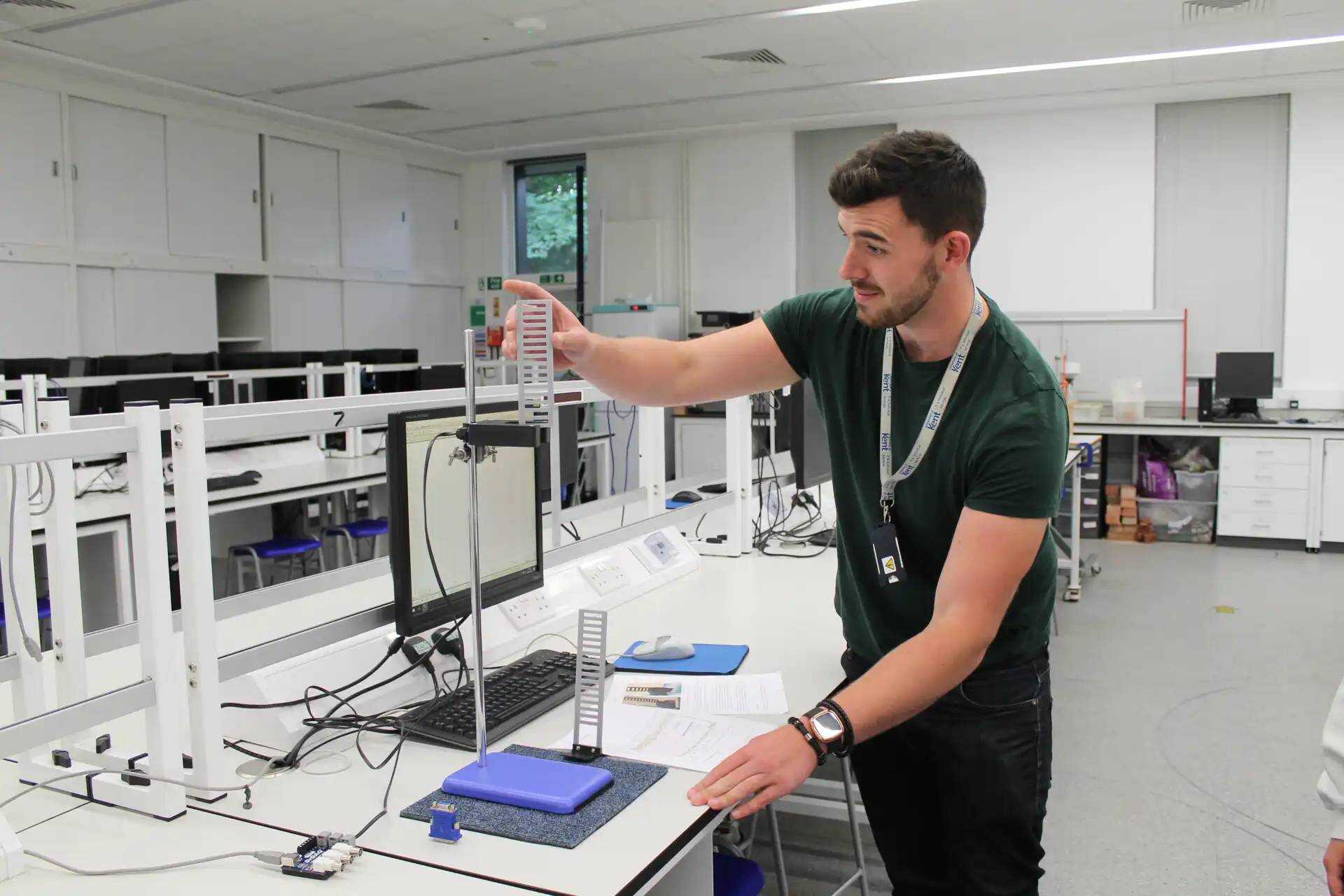
You graduate with an excellent grounding in scientific knowledge and extensive laboratory experience. In addition, you also develop the key transferable skills sought by employers, such as: excellent communication and analytical skills; problem-solving and the ability to work independently or as part of a team. This means you’re well equipped for careers in a range of fields.
Our graduates have gone on to work for companies such as:
Read some of their stories and find out about the range of support and extra opportunities available to further your career potential.
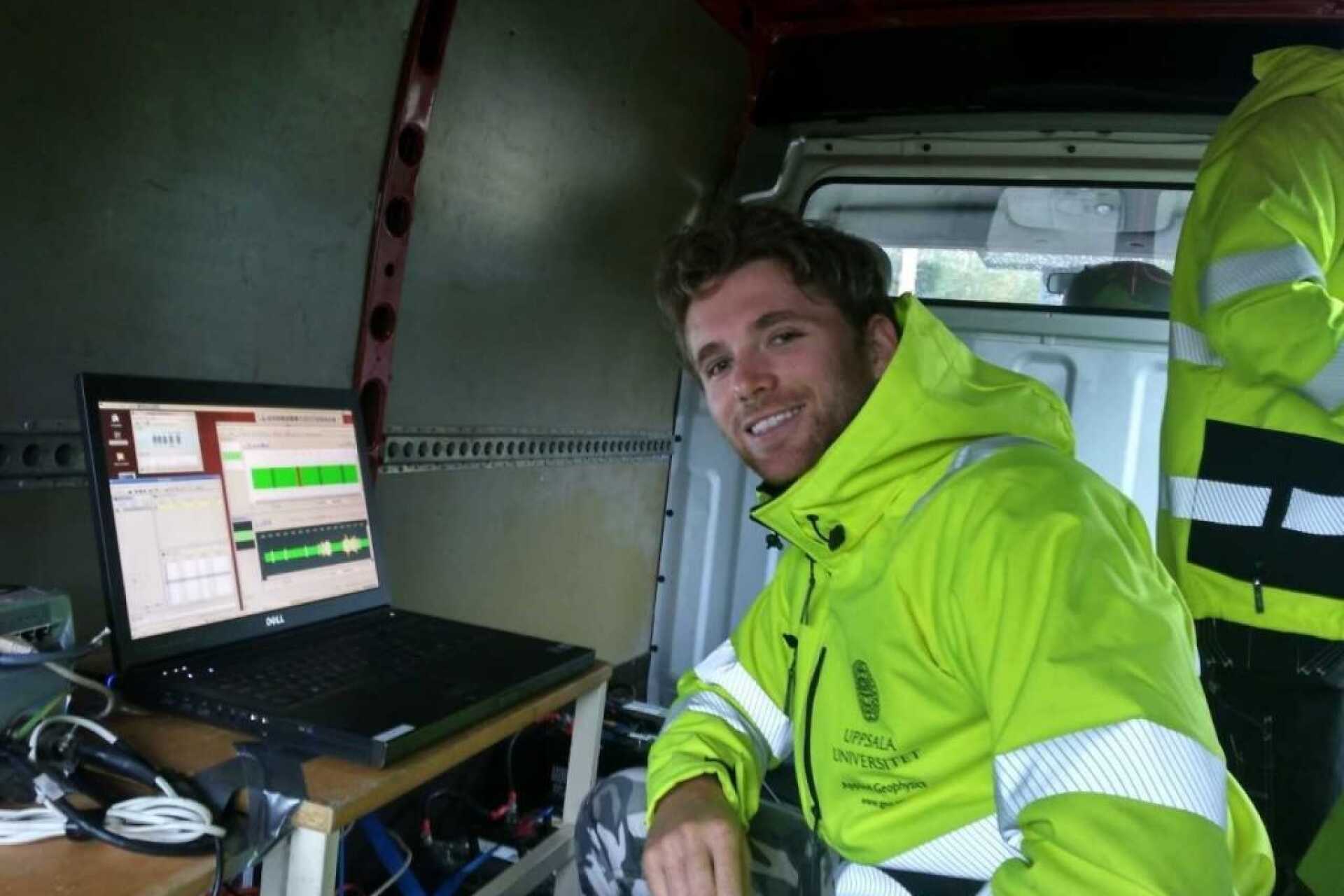
I use the knowledge I learnt on a day-to-day basis.

For students continuing on this programme, fees will increase year on year by no more than RPI + 3% in each academic year of study except where regulated.*
The University will assess your fee status as part of the application process. If you are uncertain about your fee status you may wish to seek advice from UKCISA before applying.
For details of when and how to pay fees and charges, please see our Student Finance Guide.
Find out more about accommodation and living costs, plus general additional costs that you may pay when studying at Kent.
Kent offers generous financial support schemes to assist eligible undergraduate students during their studies. See our funding page for more details.

We have a range of subject-specific awards and scholarships for academic, sporting and musical achievement.
We welcome applications from students all around the world with a wide range of international qualifications.

Student Life

In the QS World University Rankings 2024, Kent has been ranked 39th within the UK and is in the top 25% of Higher Education Institutions worldwide.
Kent Sport
Kent has risen 11 places in THE’s REF 2021 ranking, confirming us as a leading research university.

Guaranteed when you accept your offer at Kent.